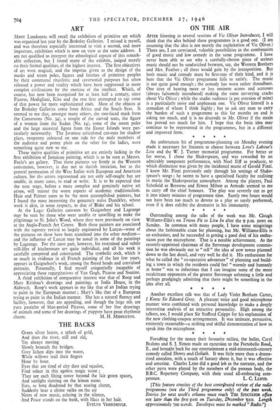ON THE AIR AFTER listening to several sessions of Vic
Oliver Introduces, I still think that the idea behind these programmes is a good one: (I am assuming that the idea is not merely the exploitation of Vic Oliver.) There are, I am convinced, valuable possibilities in the combination of good music and low comedy in the same programme. I have never been able to see why a carefully-chosen piece of serious music should not be sandwiched between, say, the Western Brothers and Mrs. Feather ; all three would gain by. the juxtaposition. But both music and comedy must be first-rate of their kind, and it is here that the Vic Oliver programme fails to satisfy. The music is not quite good enough ; the comedy has worn rather threadbare. One tires of hearing more or less eminent actors and actresses (always fulsomely introduced) making the same unvarying cracks about Vic Oliver ; while the studio audience (a pet aversion of mine) is a particularly noisy and unpleasant one. Vic Oliver himself is a comedian of whom I think highly ; but to ask any man to carry the burden of such a programme as this for months on end is asking too much, and it is no discredit to Mr. Oliver if the strain has proved too much for him. I hope that the basic idea may continue to be represented in the programmes, but in a different
and improved form. * * * *
An unfortunate bit of programme-planning on Monday evening made it necessary for listeners to choose between Loves Labour's Lost and the W. J. Turner memorial programme. For better or for worse, I chose the Shakespeare, and was rewarded by an admirably competent performance, with Noel Iliff as producer, to which distinction.was given by the incidental music of Gerald Finzi. I knew Mr. Finzi previously only through his settings of Shake- speare's songs ; he seems to have a specialised faculty for realising in music the. Shakespearian atmosphere. Among the players, Paul Schofield as Berowne and Ernest Milton as Armado seemed to me to carry off the chief honours. The play was severely cut to get it into ninety minutes of programme time. Surely two hours would not have been too much to devote to a play so rarely performed,
even if it does exhibit the dramatist in his immaturity.
* * * *
Outstanding among the talks of the week was Mr. Clough Williams-Ellis's on Towns Fit to Live In after the 9 p.m. news on Sunday. In common with many people, I have some misgivings about the fashionable craze for planning, but Mr. Williams-Ellis is an enthusiast, and he succeeded in getting a good deal of his enthu- siasm past the microphone. That is a notable achievement. As the recently-appointed chairman of the Stevenage development commis- sion he was obviously out to " sell " the idea of new towns planned down to the last detail, and very well he did it. His enthusiasm for what he called the " co-operative adventure" of planning and build- ing a town in which the residents could feel " warmly and humanly at home " was so infectious that I can imagine some of the more recalcitrant opponents of the greater Stevenage softening a little and
perhaps grudgingly admitting that there might be something in the idea after all.
* * * *
Another excellent talk was that of Lady Violet Bonham Carter, I Knew Sir Edward Grey. A pleasant voice and good microphone manner were combined with personal knowledge to make a deeply interesting analysis of an attractive personality. High among the talkers, too, I would place Sir Stafford Crtipps for his explanation of the new clothing-coupon arrangements. It was intimate, persuasive, eminently reasonable—a striking and skilful demonstration of how to
speak into the microphone. * * * *
Forsaking for the nonce their favourite milieu, the ballet, Caryl Brahms and S. J. Simon made an excursion to the Portobello Road, E., and brought back for our entertainment a mid-nineteenth-century comedy called Shorty and Goliath. It was little more than a drama- tised anecdote, with a touch of fantasy about it, but it was effective and amusina. Charles Leno did a good job as the narrator, and the other parts were played by the members of the protean iody, the B.B.C. Repertory Company, with their usual all-embracing corn- [This feature consists of the best contributed review of the radio programme (not the Third programme only) of the past week. Entries for next week's column must reach Tio SPECTATOR office not later than the first post on Tuesday, December 81st. Length approximately 700 words. Envelopes must be marked Radio."]






























 Previous page
Previous page